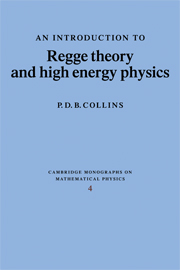Book contents
- Frontmatter
- Contents
- Preface
- 1 The scattering matrix
- 2 The complex angular-momentum plane
- 3 Some models containing Regge poles
- 4 Spin
- 5 Regge trajectories and resonances
- 6 Introduction
- 7 Duality
- 8 Regge cuts
- 9 Multi-Regge theory
- 10 Inclusive processes
- 11 Regge models for many-particle cross-sections
- 12 Regge poles, elementary particles and weak interactions
- Appendix A The Legendre functions
- Appendix B The rotation functions
- References
- Index
10 - Inclusive processes
Published online by Cambridge University Press: 07 October 2011
- Frontmatter
- Contents
- Preface
- 1 The scattering matrix
- 2 The complex angular-momentum plane
- 3 Some models containing Regge poles
- 4 Spin
- 5 Regge trajectories and resonances
- 6 Introduction
- 7 Duality
- 8 Regge cuts
- 9 Multi-Regge theory
- 10 Inclusive processes
- 11 Regge models for many-particle cross-sections
- 12 Regge poles, elementary particles and weak interactions
- Appendix A The Legendre functions
- Appendix B The rotation functions
- References
- Index
Summary
Introduction
Though many-body final states provide the bulk of the high energy scattering cross-section, individual final states are hard to analyse. They are hard to extract experimentally because it is essential to test (using energy, momentum, and quantum-number arguments) that the final-state particles observed in the detecting apparatus were the only particles produced, and to exclude all the many other different types of events which could have occurred. In particular the production of neutral particles is especially hard to detect. And, as we have found in the previous chapter, final states are also hard to analyse theoretically both because the number of independent variables increases rapidly with the number of particles, and because only a fraction of the events occur in regions of phase space which are easy to parametrize, such as the low sub-energy resonance region, or the high sub-energy Regge region.
Because of these problems it has been found more useful to concentrate attention on so-called ‘inclusive processes’, that is, processes in which a given particle or set of particles is found to occur in the final state, but no questions are asked about all the other particles which may also be present in this final state.
- Type
- Chapter
- Information
- An Introduction to Regge Theory and High Energy Physics , pp. 320 - 363Publisher: Cambridge University PressPrint publication year: 1977

